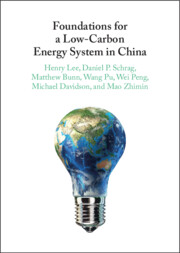Book contents
- Foundations for a Low-Carbon Energy System in China
- Foundations for a Low-Carbon Energy System in China
- Copyright page
- Contents
- Acknowledgments
- 1 Introduction
- 2 Reforming China’s Electricity Market to Facilitate Low-Carbon Transition
- 3 Promoting Large-Scale Deployment and Integration of Renewable Electricity
- 4 Enabling a Significant Nuclear Role in China’s Decarbonization
- 5 Transitioning to Electric Vehicles
- 6 From Barrier to Bridge
- 7 Coordinating Strategies to Reduce Air Pollution and Carbon Emissions in China
- 8 Conclusion
- Index
- References
1 - Introduction
Published online by Cambridge University Press: 02 December 2021
- Foundations for a Low-Carbon Energy System in China
- Foundations for a Low-Carbon Energy System in China
- Copyright page
- Contents
- Acknowledgments
- 1 Introduction
- 2 Reforming China’s Electricity Market to Facilitate Low-Carbon Transition
- 3 Promoting Large-Scale Deployment and Integration of Renewable Electricity
- 4 Enabling a Significant Nuclear Role in China’s Decarbonization
- 5 Transitioning to Electric Vehicles
- 6 From Barrier to Bridge
- 7 Coordinating Strategies to Reduce Air Pollution and Carbon Emissions in China
- 8 Conclusion
- Index
- References
Summary
In the struggle to mitigate the worst impacts of global climate change, China’s energy transformation will be a critical example for the rest of the world. As the world’s largest emitter of greenhouse gases and the world’s second-largest economy, China’s strategies for blending economic growth with decarbonization will be watched carefully, particularly by rapidly-growing countries at earlier stages of development. China has made it clear to the world that it takes climate change seriously, and it is investing in multiple decarbonization strategies, from widespread deployment of wind and solar, to a growing nuclear program, to electrification of transportation. Indeed, China now leads the world in all three major forms of nonfossil energy deployment: wind, solar, and nuclear. China’s bilateral agreement with the United States in 2014 was critical to energizing the Paris Agreement. China agreed to stabilize current emissions by 2030, and to increase its share of nonfossil primary energy (i.e., hydro, nuclear, wind, and solar) to 20 percent of total primary energy. But beyond 2030, China will need to start reducing emissions, joining most other developed countries in a steady march toward zero emissions, if it is to make good on its pledge to reach carbon neutrality by 2060.
Information
- Type
- Chapter
- Information
- Foundations for a Low-Carbon Energy System in China , pp. 1 - 14Publisher: Cambridge University PressPrint publication year: 2021
